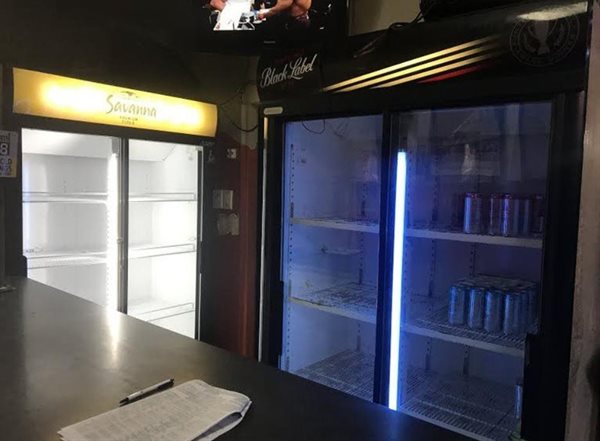Since late December, the Lucky Plaza Tavern in Parow has been empty of life. Established in 2000 in Station Road, the tavern usually attracts a buzz of customers who buy meat from the next-door butchery and enjoy music and a braai. But since the alcohol ban, it is quiet.

Empty fridges mark the alcohol ban at Yalta’s Pub and Grill in Parow. Photo: Tariro Washinyira
Paul de Gouveia, who owns both tavern and butchery, says his business was hit by the first alcohol ban and he was trying to revive it when the second ban kicked in. He had to create positions in the butchery for three employees who were running the tavern to avoid job losses.
Now the alcohol business has had to close, and with no-one coming to the tavern, the butchery has also been affected.
“There is no business at the moment, it is bad. We are closed down. People don’t come into a bar to buy cool drinks. I have to take money out of my pocket to pay about R20,000 rent per month. I thank God I don’t owe suppliers. Everything we had was paid for because we pay on delivery,” he said.
De Gouveia said he had no hope that business would pick up again. “A lot of people have lost their jobs, there is no money coming in to those people, meaning there is no money to spend on alcohol. People are adjusting to a new style of living.”
The alcohol ban announced by President Cyril Ramaphosa on 28 December was aimed at lowering pressure on hospital beds. “Reckless behaviour due to alcohol intoxication has contributed to increased transmission. Alcohol-related accidents and violence are putting pressure on our hospital emergency units,” said Ramaphosa. A study at Groote Schuur Hospital suggested that the ban had freed up much-needed beds by reducing the number of trauma cases.
“In future people who drink alcohol need to learn to control themselves and stop fighting and killing,” said de Gouveia.
A few metres away from Lucky Tavern, Audry Mundandi, manager of Yalta’s Pub and Grill, was checking on things inside the pub. Pointing to one empty fridge and another containing a few bottles of Red Bull he said, “Business is dying. Breadwinners have lost their only source of income.”
GroundUp asked the President’s office if there had been meetings about a review of the alcohol ban but acting spokesperson Tyrone Seale did not respond.
Daniel Johnson, spokesperson to the Western Cape MEC for Agriculture, Ivan Meyer told GroundUp on 25 January that the department had sent two letters to the National Minister of Agriculture Thoko Didiza asking for her help to lift the ban and allow wine and liquor to be sold and wine to be served in restaurants and wine-tasting rooms.
Meyer said the ban had achieved its objective and that the economic damage of a continued ban outweighed the benefits. “Wine grapes represent 50% of the 181,233 hectares under fruit production in the Western Cape and the replacement value of these wine grapes amounts to R33.94bn. Wine is the biggest export product of the Western Cape economy and contributes 6,5% to the value of exports from the province.”
He said the department estimated that 45,610 people worked in wine production and the industry supported the livelihoods of 228,053 people.
The Agriculture Department’s spokesperson Reggie Ngcobo did not respond to GroundUp’s questions.



















































